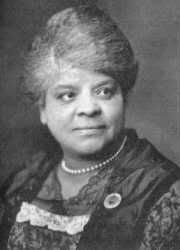Bloggers have often been called "citizen journalists." We face obstacles that traditional journalists do not, namely access. Ida B. Wells faced obstacles in her day, as well: she wasn't white.
 Ida B. Wells was an activist for civil rights. She campaigned against lynching and protested for women's suffrage. Born in 1862, she was certainly ahead of her time. A Webster University article outlines her struggle:
Ida B. Wells was an activist for civil rights. She campaigned against lynching and protested for women's suffrage. Born in 1862, she was certainly ahead of her time. A Webster University article outlines her struggle:
She later attended college at Fisk University in Nashville, Tennessee, where she was an outspoken advocate for women's rights. According to Wikipedia, she's quoted as writing: "I will not begin at this late day by doing what my soul abhors; sugaring men, weak deceitful creatures, with flattery to retain them as escorts or to gratify a revenge."
In 1884, Wells was asked to abandon a seat on the train she had paid for in first class and instead sit in the smoking car. When she refused, she was physically assaulted by three men, and instead of moving to the smoking car, she exited the train at the next stop. She hired a lawyer and sued; the court awarded her $500 in damages. Wells shared her story with The Living Way, a weekly church newspaper in the black community, and thus began her writing career.
In the late 1800s, Wells toured the United States and Europe on an anti-lynching campaign. In 1909, she helped to found the National Association for the Advancement of Colored People, an organization that still exists today.
She died in 1931 after a long life of struggle for equal rights. She was an activist, an advocate, a journalist and a pioneer. Her bold actions undoubtedly helped foster and inspire a civil rights movement that would one day bring equality to our country.
 Ida B. Wells was an activist for civil rights. She campaigned against lynching and protested for women's suffrage. Born in 1862, she was certainly ahead of her time. A Webster University article outlines her struggle:
Ida B. Wells was an activist for civil rights. She campaigned against lynching and protested for women's suffrage. Born in 1862, she was certainly ahead of her time. A Webster University article outlines her struggle:Wells was characterized as a militant and uncompromising leader for her efforts to abolish lynching and establish racial equality. Wells challenged segregation decades before Rosa Parks, ran for Congress and attended suffrage meetings with the likes of Susan B. Anthony and Jane Addams, yet most of her efforts are largely unknown due to the fact that she is African American and female.She was born in Mississippi to a carpenter and a cook, slaves that found freedom only a few years after Ida's birth. She dropped out of school at age 16 to take care of her family after her parents and a sibling died of yellow fever.
She later attended college at Fisk University in Nashville, Tennessee, where she was an outspoken advocate for women's rights. According to Wikipedia, she's quoted as writing: "I will not begin at this late day by doing what my soul abhors; sugaring men, weak deceitful creatures, with flattery to retain them as escorts or to gratify a revenge."
In 1884, Wells was asked to abandon a seat on the train she had paid for in first class and instead sit in the smoking car. When she refused, she was physically assaulted by three men, and instead of moving to the smoking car, she exited the train at the next stop. She hired a lawyer and sued; the court awarded her $500 in damages. Wells shared her story with The Living Way, a weekly church newspaper in the black community, and thus began her writing career.
In the late 1800s, Wells toured the United States and Europe on an anti-lynching campaign. In 1909, she helped to found the National Association for the Advancement of Colored People, an organization that still exists today.
She died in 1931 after a long life of struggle for equal rights. She was an activist, an advocate, a journalist and a pioneer. Her bold actions undoubtedly helped foster and inspire a civil rights movement that would one day bring equality to our country.







1 comment:
Thank you for giving some attention to a woman who greatly deserves it.
Post a Comment